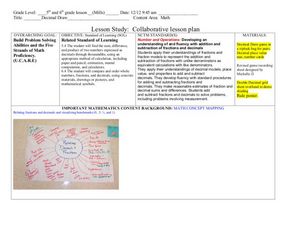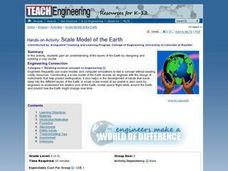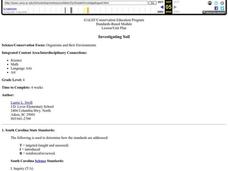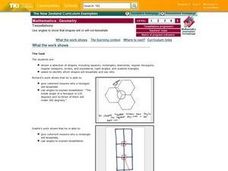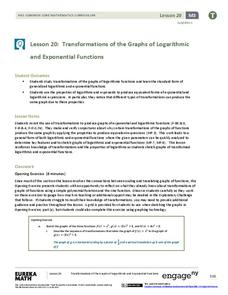Curated OER
Computers Can Only Add
Young scholars explore using mathematics to solve problems in base two. After a teacher demonstration of using base two to write numbers. students model similar problems to explore the concept of number systems in different bases. To...
Curated OER
Decimals: Collaborative Lesson
Learners explore mathematics by participating in a group activity. In this number value lesson, students identify the uses for decimals and how to best estimate whole numbers based on decimals and fractions. Learners collaborate with...
Curated OER
Trash Count
Young scholars identify pollution around their local community. They discuss the sources of polution and categorize objects based on their properties. They discover ways to make changes to the environment and how to inform the public.
Curated OER
Geometry: Lesson 2
Eighth graders engage in a lesson that is concerned with examining two dimensional figures with different properties that include circles, triangles, queadrilaterals, etc... They identify the types of figures that is identified as polygons.
Curated OER
My Dogs
Students use the properties of multiplication to solve problems. They recall the basic multiplication facts as well as write and solve problems that involve whole numbers.
Curated OER
And The Twelfth One Is
Ninth graders play guess my shape (either describe or use a feely bag to introduce the 3 shapes in the problem.) As they are identified put them in an order as shown in the problem. As the students work on the problem in pairs teacher...
Curated OER
Scale Model of the Earth
Students work together to create a model of the Earth. They label and identify each layer and describing its properties. They discover how engineers use models to test different concepts.
Curated OER
Investigating Soil
Fourth graders swap local soil samples with another school and examine the differences. They research soil properties, identify organisms that live in soil, create and maintain a biome of soil decomposition and design a poster to present...
Curated OER
Where My Peeps At?
Students conduct a series of activity that demonstrates Charles' and Boyle's Law. In this chemistry lesson plan, students determine the relationship among pressure, volume and temperature. They solve problems using mathematical...
Curated OER
Tessellations: Use Angles To Show That Shapes Will or WIll Not Tessellate
Students observe a selection of shapes. They identify which shapes will tessellate and justify their answer. Students apply the symmetry and angle properties of polygons to create tessellations.
Curated OER
"Ball Bounce" Quadratic Functions
Young scholars manipulate a ball and explore quadratic functions. In this algebra lesson, young scholars analyze the graph of a quadratic function. They identify quadratic properties.
EngageNY
Transformations of the Graphs of Logarithmic and Exponential Functions
Transform your lesson on transformations. Scholars investigate transformations, with particular emphasis on translations and dilations of the graphs of logarithmic and exponential functions. As part of this investigation, they examine...
EngageNY
One-Step Equations—Multiplication and Division
Discover one more step to being able to solve any one-step equation. Scholars continue their work with one-step equations in the 28th installment of a 36-part module. Tape diagrams and algebraic processes introduce how to solve one-step...
EngageNY
Bacteria and Exponential Growth
It's scary how fast bacteria can grow — exponentially. Class members solve exponential equations, including those modeling bacteria and population growth. Lesson emphasizes numerical approaches rather than graphical or algebraic.
EngageNY
Graphing the Logarithmic Function
Teach collaboration and communication skills in addition to graphing logarithmic functions. Scholars in different groups graph different logarithmic functions by hand using provided coordinate points. These graphs provide the basis for...
EngageNY
Angles Associated with Parallel Lines
Explore angle relationships created by parallel lines and transversals. The 13th lesson of 18 prompts scholars use transparency paper to discover angle relationships related to transversals. Learners find out that these angles pairs are...
EngageNY
Existence and Uniqueness of Square Roots and Cube Roots
Teach cube roots by building on an understanding of square roots. The third installment of a 25-part series asks learners to solve simple quadratic and cubic equations using roots. Scholars compare square roots and cube roots throughout...
EngageNY
Dilations as Transformations of the Plane
Compare and contrast the four types of transformations through constructions! Individuals are expected to construct the each of the different transformations. Although meant for a review, these examples are excellent for initial...
EngageNY
A Surprising Boost from Geometry
Working with imaginary numbers — this is where it gets complex! After exploring the graph of complex numbers, learners simplify them using addition, subtraction, and multiplication.
EngageNY
Choosing a Model
There's a function for that! Scholars examine real-world situations to determine which type of function would best model the data in the 23rd installment of a 35-part module. It involves considering the nature of the data in addition to...
EngageNY
The Zero Product Property
Zero in on your pupils' understanding of solving quadratic equations. Spend time developing the purpose of the zero product property so that young mathematicians understand why the equations should be set equal to zero and how that...
EngageNY
Modeling with Exponential Functions
These aren't models made of clay. Young mathematicians model given population data using exponential functions. They consider different models and choose the best one.
EngageNY
Fundamental Theorem of Similarity (FTS)
How do dilated line segments relate? Lead the class in an activity to determine the relationship between line segments and their dilated images. In the fourth section in a unit of 16, pupils discover the dilated line...
EngageNY
True and False Number Sentences
True or false? Scholars determine the truth value of equations and inequalities through substitution. All values to use for substitution are given with each equation or inequality. This is the 24th lesson in a module of 36.

